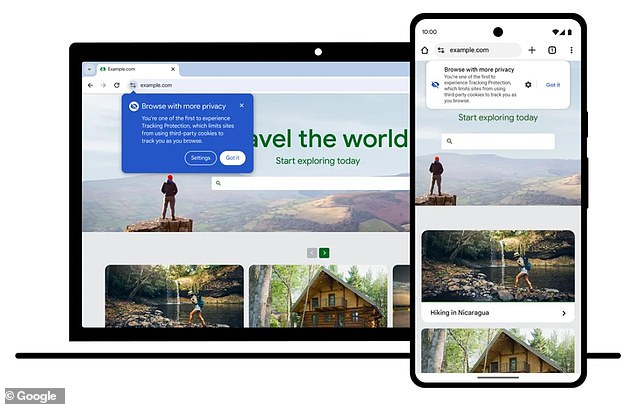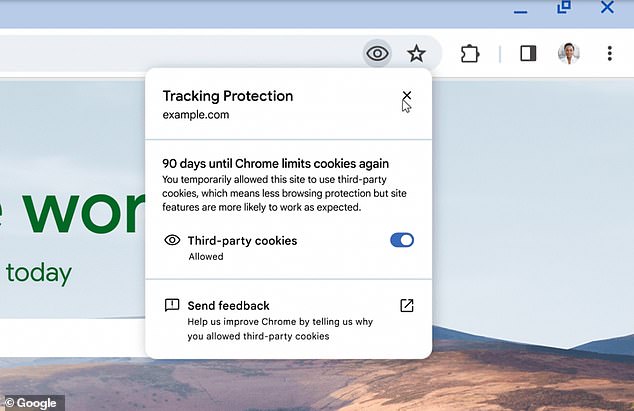Google will turn off cookies for MILLIONS of people on January 4 – here’s what it means for you
It is one of the most privacy-invading technologies on the web.
But as of January 4th, Google has begun turning off third-party cookies — intrusive computer files that track your behavior.
The tech giant randomly selects 1% of Chrome users around the world – about 30 million people – to be the first to use a feature called Tracking Protection.
Part of Google's controversial Privacy Sandbox program, it will limit websites' use of third-party cookies to track users as they browse the web to show relevant ads.
Here's what the change means for you — and whether you'll have to do anything when it takes effect.
Starting January 4, a portion of Google Chrome users will start seeing fewer cookies — small files that are downloaded to your computer or mobile device when you visit a website.
If you're one of the people randomly selected to protect against tracking on January 4, you'll see a notification on your Chrome desktop or browser.
It will read: “You're one of the first people to try Tracking Protection, which prevents sites from using third-party cookies to track you while you browse.”
This will change automatically, so as you browse the web, third-party cookies will be restricted by default, limiting the ability to track you across different websites.
Anyone who wants third-party cookies to persist on Chrome for any reason can re-enable them by clicking on the eye icon in the search bar.
However, even if you're not selected for the initial rollout, the days of third-party cookies on Chrome are numbered.
Google plans to completely phase out the use of third-party cookies when Tracking Protection reaches all users in the second half of 2024.
in Blog postGoogle described Tracking Protection as a “key milestone” in its much-touted Privacy Sandbox initiative, which aims to “create technologies that protect people’s privacy online.”
“When it comes to improving privacy on the web, the work never ends,” the company said.
That's why at Chrome, we continue to invest in features that protect your data and provide more control over how it's used.
“This includes taking steps to limit the ability to track your activity across different websites.
“On January 4, we will begin testing Tracking Protection, a new feature that limits cross-site tracking by restricting website access to third-party cookies by default.”

If you're one of those randomly selected, you'll see a notification on your Chrome desktop or browser
Google said third-party cookies have been “a fundamental part of the web for nearly three decades, but are viewed as an intrusion into privacy because they leak our online activity to advertisers.”
Google said Tracking Protection targets third-party cookies, which are placed on a user's device by websites other than the one the user visits — typically by digital advertising agencies.
Third-party cookies are created when a user visits a website that includes elements from other websites, such as third-party images or advertisements.
They contrast with first-party cookies, which are set by the site the user is visiting and are often useful, as they allow the browser to remember important user information.
Google plans to replace third-party cookies with a new system that restricts data sharing within its organization, which it says is better for our privacy.
Essentially, advertisers will have to ask Chrome what kind of topics they want us to browse — like fashion, food, or travel — instead of directly accessing our browsing data.
However, it is not without controversy, as regulators fear the change will increase Google's dominance of the online advertising market.

Anyone who wants third-party cookies to persist in Chrome for any reason can re-enable them by clicking the eye icon in the search bar
Advertisers said the loss of cookies in the world's most popular browser would limit their ability to collect information to personalize ads and make them dependent on Google's user databases.
Google plans to block third-party cookies for all users in 2024 to address antitrust concerns raised by the UK Competition and Markets Authority (CMA).
Andrea Coselli, the regulator's former chief executive, said the body would be “closely monitoring” the Silicon Valley giant and “we are under no illusions that our work is done.”
(Tags for translation) Daily Mail
